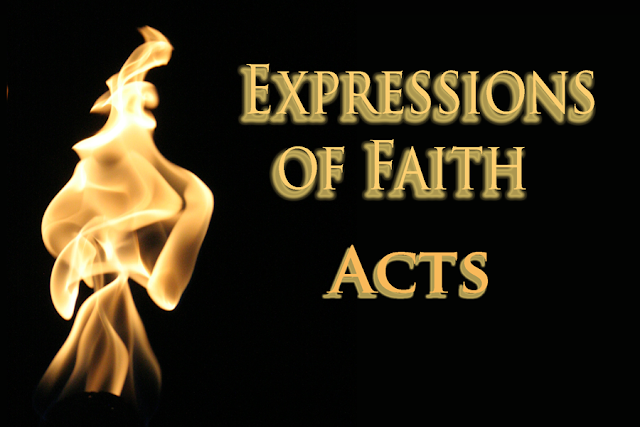Thoughts on Study Questions on Acts Ch 2 from 7/1
My Sunday school class/Life Group is studying the book of Acts. Monday, I posted the questions we discussed the day before. Today, I’m posting some of the comments from the class discussion.
Chapter 2
V1-13
Look at verses 1-4:
Why could it be argued that these verses are both and an end and a beginning?
The key idea here is OBEDIENCE. The disciples prepared themselves for this!
The END of the Law --> The BEGINNING of the Holy Spirit.
The END of WAITING --> The BEGINNING of DOING.
What happened here?
The END of the Law --> The BEGINNING of the Holy Spirit.
The END of WAITING --> The BEGINNING of DOING.
They waited --> a sound --> wind --> tongues of fire.
In 1 Kings, Elijah is recovering after his confrontation with the priests of Baal. After a couple of good meals and a lot of sleep...
11 The Lord said, “Go out and stand on the mountain in the presence of the Lord, for the Lord is about to pass by.”
Then a great and powerful wind tore the mountains apart and shattered the rocks before the Lord, but the Lord was not in the wind. After the wind there was an earthquake, but the Lord was not in the earthquake. 12 After the earthquake came a fire, but the Lord was not in the fire. And after the fire came a gentle whisper.13 When Elijah heard it, he pulled his cloak over his face and went out and stood at the mouth of the cave.
Then a voice said to him, “What are you doing here, Elijah?”
In a similar sequence to Pentecost, Elijah meets God's spirit after wind and fire.
Many scholars now believe that the baptism by the Holy Spirit did not occur in the Upper Room. Based on what happens immediately following, they make a case for the Southern Steps of the Temple inside the Court of the Gentiles. Visitors to Jerusalem would have seen the event and immediately heard the disciples speaking in their language.
What preparation was made?
Again OBEDIENCE is a key factor. The 120 waited, prayed, came to agreement, and kept praying.
An Aside.
John 14:1-2 is where Jesus talks to His disciples about heaven.
“Do not let your hearts be troubled. You believe in God; believe also in me. 2 My Father’s house has many rooms; if that were not so, would I have told you that I am going there to prepare a place for you?This is often taken literally, where rooms are rooms. But, God's Kingdom is spiritual. What if we (our souls) are the rooms?
Jesus finishes the thought in verses 3-4.
3 And if I go and prepare a place for you, I will come back and take you to be with me that you also may be where I am. 4 You know the way to the place where I am going.”By whom?
The preparation was both CORPORATE and INDIVIDUAL.
Why did the Holy Spirit come at Pentecost?
What is the most significant aspect of this passage?
It is a personal experience.
Disciples are filled and begin to speak in languages foreign to them.
People heard in their native language.
In the Old Testament, the Holy Spirit came for one specific task and then was gone.
Question: What would happen/How would you feel if the Holy Spirit left you?
We got this far this week.
This is the link to my first Expressions of Face devotional post on Acts Chapter 2. Acts 2:1-4, 41 is the Scripture basis.
Why would there be 1) wind and 2) fire and then the Holy Spirit?
Why were there so many foreign Jews in Jerusalem at this time?
How does the list of countries in verses 9-11 relate to God's plan as given in Matthew 28:19 and Acts 1:8?
The last biblical evidence of Peter's speech identified him as Galilean. When and where was that?
What is significant about Peter’s (and the others from the upper room) speech in this verses 6-12?
What event this "other language" aspect of Pentecost correct?
In verse 13, "some made fun of them." Who might this have been?
Chapter 2
V14-36
This has been called "Peter's first sermon." What are some characteristics and major themes of this sermon?
Why would Peter begin with the prophet Joel?
Peter moves from Old Testament prophecy to hard-hitting condemnation of the crowd in vv22-23. How does this set up vv24-28?
What is the significance of using David as an example?
What explanation (almost in passing) does Peter give for the cause of the events of the day?
Verse 36 contains two key terms in describing Jesus. What are they are why is each significant?
1
2
Chapter 2
V37-41
Why would the crowd be "cut to the heart" by Peter's message?
Explain Peter's reply to the question "What shall we do?"
How effective was Peter's sermon?
Chapter 2
V42-47
This section describes the first "Christian" church. List as many characteristics of this church as you can.
Which characteristic made the greatest impression on the people of Jerusalem?
Which characteristics would be easiest for the church of today to attain? which the hardest? Why?
How do we know this church was evangelistic?
This Friday, my Expression of Faith is Fellowship (With Believers?)
I'd appreciate your feedback on Blogger!




Comments
Post a Comment